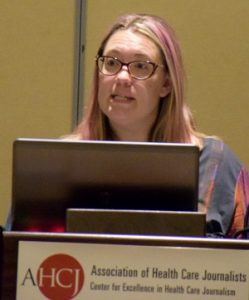
PHOENIX — Think about medical studies: One can conclude a certain thing and another one will say the opposite. They can be scary and confusing.
“Just because something is statistically significant, doesn’t mean it’s clinically significant,” F. Perry Wilson, M.D., M.S.C.E., assistant professor of medicine at Yale University, told about 50 people at a conference.
Throughout the Thursday session at Health Journalism 2018, the Association of Health Care Journalists’ conference in Phoenix, one theme was apparent: Medicine affects everyone and it is highly personal and relevant.
“I think fear does drive interest in medicine in general and in a lot of medical studies and that’s okay. I like people being interested in what we do,” Wilson said. “But I would encourage reporters to also find some of the wonder in medical studies.”
The session, moderated by Tara Haelle, AHCJ’s core topic leader on medical studies, focused on giving journalists the tools they need to do their job more effectively, so that readers and viewers know what a study will mean for them.
“I would encourage people to care a bit less about the statistics as they’re presented and a little bit more about how this study is going to affect real people,” Wilson said after the session.
Wilson recommended when people look at studies they focus on how many people are in it, who funded it and how reputable the source is.
“Different studies have looked at perceptions of fraud in medical research and have come to very differing conclusions in terms of concrete evidence of outright fraud,” he said. “Until we change the incentive structure for researchers away from getting big grants and publishing these high-impact papers, I think you’re going to continue to see that.”
While many medical studies may contradict, experts say each one has value.
“Science works as a mob more than as an individual,” Wilson said. “Studies conflicting is great especially when it’s based on good science because that’s how we sort of move the field forward.”
Video: Tyler Fingert, Cronkite News
Students from the Walter Cronkite School of Journalism and Mass Communication at Arizona State University are reporting this week from Health Journalism 2018. Cronkite is home to Arizona PBS and students receive hands-on experiences working for Cronkite News, a multiplatform daily news operation.








